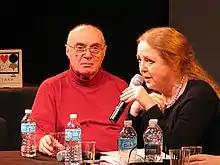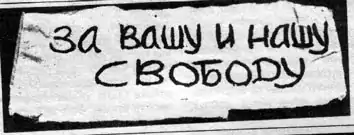Pavel Litvinov
Pavel Mikhailovich Litvinov (Russian: Па́вел Миха́йлович Литви́нов, born 6 July 1940) is a Russian-born U.S. physicist, writer, teacher, human rights activist and former Soviet-era dissident.
Pavel Mikhailovich Litvinov | |
|---|---|
Павел Михайлович Литвинов | |
 Pavel Litvinov and Irena Grudzińska-Gross, reading for Natalya Gorbanevskaya, 2014 | |
| Born | July 6, 1940 Moscow, Soviet Union |
| Nationality | Russian |
| Alma mater | Moscow State University |
| Known for | Human rights activism and participation in the 1968 Red Square demonstration and dissident movement in the Soviet Union |
| Children | Sergey, Joseph, Dimitri, and Lara Julia M. Santiago, spouse of Pavel Litvinov |
| Scientific career | |
| Fields | physics |
| Institutions | Moscow State University of Fine Chemical Technologies, Hackley School |
Biography
The grandson of Ivy Low and Maxim Litvinov, Joseph Stalin's foreign minister during the 1930s, Pavel Litvinov was raised amongst the Soviet elite. As a schoolboy, he was devoted to the cult of Stalin, and was tapped, unsuccessfully, by the KGB to report on his parents Flora and Misha Litvinov (a story that is related by the journalist David Remnick in his book Lenin's Tomb).
After the death of Joseph Stalin in 1953 and the return of family friends from the labor camps, Pavel grew disillusioned with the Soviet system. He had a short-lived marriage when he was 17. While in his 20s, he became a physics teacher at the Institute for Chemical Technology. During his time at the Institute, Litvinov became acquainted with a group of intellectuals who were following the show-trials of the dissidents Andrei Sinyavsky and Yuli Daniel. His immersion in samizdat literature at this time brought him into contact with the works of Aleksandr Solzhenitsyn, Varlam Shalamov and Robert Conquest.
When writers Alexander Ginzburg and Yuri Galanskov were tried for publishing samizdat in 1967, Pavel Litvinov and Larisa Bogoraz released their famous "Appeal to World Public Opinion", appealing to the international public to protest against the closed trial. Over the following years, Litvinov became active in the dissident civil rights movement and was an editor of its regular samizdat bulletin Chronicle of Current Events. The periodical, founded in 1968, documented searches, arrests, and court proceedings in Russia and other Soviet states.

Litvinov was one of the participants in the 1968 Red Square demonstration against the Soviet invasion of Czechoslovakia (see Prague Spring), that had taken place four days earlier. Among the others were Larisa Bogoraz, a philologist, Natalya Gorbanevskaya, a poet, Vadim Delaunay, poet, Viktor Fainberg, an art critic, and Vladimir Dremlyuga, history student. They raised banners in Czech and Russian, expressing support of the Czechoslovak independence and solidarity with Alexander Dubček, the Czechoslovak leader who was the architect of the Prague Spring.
The KGB promptly arrested the protesters, brutally beat them, and their secret trial was held that October. Litvinov was sentenced to five years' exile in Chita, Zabaykalsky Krai, Siberia.
In 1974, after his return from exile, he and his wife Maya left the Soviet Union to Vienna by train and from there to Rome until they moved to United States. In New York, he joined fellow émigré dissident Valery Chalidze in publishing A Chronicle of Human Rights in the USSR, which documented political repression.[1]:79
Litvinov currently lives in the United States, where he taught physics and mathematics at the Hackley School in Tarrytown, New York from 1976 until his retirement in 2006.[2]
Other
Pavel Litvinov is a son-in-law of the dissident and literary scholar Lev Kopelev.[3] His son Dima Litvinov is an environmental activist with Greenpeace. In 2013, he was arrested as part of the Greenpeace Arctic Sunrise ship case.[3]
Pavel Litvinov is a member of the board of the Andrey Sakharov Foundation.[3]
In 2005 Pavel Litvinov participated in "They Chose Freedom", a four-part television documentary on the history of the Soviet dissident movement
See also
Notes
- Horvath, Robert (2005). The Legacy of Soviet Dissent: Dissidents, Democratisation and Radical Nationalism in Russia. BASEES/Routledge Series on Russian and East European Studies. 17. London; New York: RoutledgeCurzon. ISBN 9780203412855.
- Hackley School e-Connect newsletter, June 2, 2006 Archived September 28, 2007, at the Wayback Machine, accessed July 23, 2007.
- Litvinov, Pavel (2013-10-25). "Facing Russian prison for a peaceful protest". www.washingtonpost.com. Washington Post. Retrieved 2015-08-14.
Bibliography
- Litvinov, Pavel (1969). Dear Comrade: Pavel Litvinov and the voices of Soviet citizens in dissent. Pitman Publishing Corporation. ASIN B000O05GKK.
- Litvinov, Pavel (1969). The Demonstration in Pushkin Square. Harvill Press. ISBN 978-0002721516.
- Litvinov, Pavel (November 1969). "Deux accusés parlent" [Two defendants speak]. Esprit (in French). 386 (11): 635–639. JSTOR 24261416.
- Litvinov, Pavel (1972). The Trial of the Four. A Collection of Materials on the Case of Galanskov, Ginzburg, Dobrovolsky, and Lashkova. New York: Viking Press. ASIN B002MRXGRI.
- Litvinov, Pavel (March 1975). "The human rights movement in the USSR". Index on Censorship. 4 (1): 11–15. doi:10.1080/03064227508532389. S2CID 146906418.
- Baraheni, Reza; Litvinov, Pavel; Sostre, Martin (15 July 1976). "Free Mustafa Dzhemilev". The New York Review of Books.
- Litvinov, Pavel (Winter 1980). "Momentary enthusiasms don't help – only persistence will secure human rights gains". Jurimetrics. 21 (2): 135–142. JSTOR 29761738.
- Alexeyeva, Lyudmila; Grigorenko, Pyotr; Amalrik, Andrei; Kaminskaya, Dina; Simes, Konstantin; Williams, Nikolai; Litvinov, Pavel; Litvinova, Maya; Sadomskaya, Natalya; Chalidze, Valery; Shragin, Boris; Stain, Yuri (2013) [1978]. "В защиту Анатолия Марченко" [In defense of Anatoly Marchenko]. Kontinent (in Russian). 152.
- Aksenov, Vasily; Etkind, Efim; Grigorenko, Pyotr; Grigorenko, Zinaida; Kopelev, Lev; Litvinov, Pavel; Litvinov, Maya; Mihajlov, Mihajlo; Proffer, Carl; Proffer, Ellendea; Synyavsky, Andrey; Shraginet, Boris; et al. (4 February 1982). "Help the Poles". The New York Review of Books.
- Phillips, William; Shragin, Boris; Aleshkovsky, Yuz; Kott, Jan; Siniavski, Andrei; Aksyonov, Vassily; Litvinov, Pavel; Dovlatov, Sergei; Nekrassov, Viktor; Etkind, Efim; Voinovich, Vladimir; Kohak, Erazim; Loebl, Eugen (Winter 1984). "Writers in exile III: a conference of Soviet and East European dissidents". The Partisan Review. 51 (1): 11–44.
- Litvinov, Pavel (January 1992). "Waiting for the new dictators". Index on Censorship. 21 (1): 2–4. doi:10.1080/03064229208535244. S2CID 143559586.
- Litvinov, Pavel (18 June 2005). "No American 'Gulag'". The Washington Post.
- Litvinov, Pavel (25 October 2013). "Facing Russian prison for a peaceful protest". The Washington Post.
Further reading
- De Boer, S. P.; Driessen, Evert; Verhaar, Hendrik (1982). "Litvinov, Pavel Mikhajlovič". Biographical dictionary of dissidents in the Soviet Union: 1956–1975. The Hague: Martinus Nijhoff Publishers. pp. 326–327. ISBN 978-9024725380.
- Reve, Karel van het (1969). Letters and telegrams to Pavel M. Litvinov, December 1967–May 1968. D. Reidel.
External links
- "Archived copy" Павел Литвинов: «Я с гордостью назову себя либералом». www.colta.ru (in Russian). 2015-05-21. Archived from the original on 2018-08-27. Retrieved 2015-08-18.CS1 maint: archived copy as title (link)
- Интервью на Эхо Москвы (in Russian). Retrieved 2015-08-18.
- Natella Boltyanskaya (25 August 2014). "Семнадцатая серия. Павел Литвинов" [The seventeenth part. Pavel Litvinov]. Voice of America (in Russian). Parallels, Events, People.